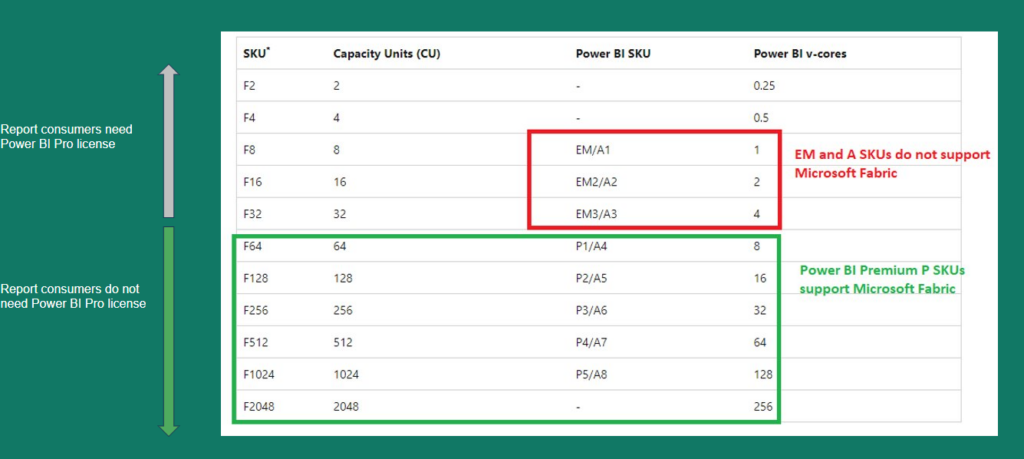In today’s data-centric landscape, businesses harness the power of tools like Microsoft Fabric and Power BI to convert data into valuable insights. Are you looking for a way to turn your data into actionable insights with Microsoft Fabric? If so, you might be wondering how to choose the right capacity license type for your needs. Microsoft Fabric offers a variety of options, each with its benefits and drawbacks. In this blog post, we’ll explain the key terms and concepts related to Microsoft Fabric capacity licenses, and help you find the best fit for your business goals. Whether you’re new to Microsoft Fabric or already using Power BI Premium, you’ll discover how to optimize your analytics capabilities and unlock the full potential of Microsoft Fabric.
Understanding Key Terms
In the realm of Microsoft Fabric, data resides in OneLake, powered by a dedicated set of resources known as capacity. This capacity determines computation power, available on a pay-as-you-go basis as well, allowing dynamic scaling and even pausing with no usage commitments. Fabric workspaces are intricately linked to capacity. Fabric workspaces store Fabric items like Lake houses, Warehouses, Datasets, Reports, etc.
Fabric Capacity, measured in Capacity Units (CUs), defines the speed and performance of your Fabric workloads. You can choose lower or higher SKUs (Stock Keeping Units) for Microsoft Fabric capacity license, based on your workload size. There are two main categories of SKUs: Azure (F SKUs) and Microsoft 365 (P SKUs). Azure SKUs range from F2 to F2048, with each F SKU providing 2 Capacity Units (CU) of compute power. For example, F2 has 2 CUs, F4 has 4 CUs, and so on. With larger SKU sizes, more total capacity units are accessible, which enables more efficient and concurrent running of complex workloads.
Exploring Microsoft Fabric Capacity Scenarios
Microsoft Fabric Trial Capacity:
- Ideal for businesses initiating their Microsoft Fabric journey.
- Enables creation and collaboration within trial capacity.
- Offers a firsthand experience of platform capabilities before committing to a specific license type.
Power BI Premium Per Capacity (P SKUs):
- Designed for organizations with existing Power BI Premium capacity SKUs.
- Provides unified access to Power BI Premium features and Microsoft Fabric workload through a seamless product experience.
- P SKUs are also called the Microsoft 365 SKUs, which are billed monthly or yearly with a monthly commitment.
- Provides a predictable billing structure suitable for businesses seeking stability in subscription costs.
For those already equipped with Power BI Premium Per Capacity SKUs, enabling Microsoft Fabric is a straightforward process through the Admin portal. The organization’s Power BI Admin or Fabric Admin can activate Microsoft Fabric for the entire tenant or for a specific capacity. In both scenarios, security groups prove instrumental in granting access to designated user lists. This feature is especially beneficial for experimenting within smaller user groups.
Fabric Capacity Pay-as-You-Go (F SKUs):
- Suitable for organizations without Power BI premium capacity SKUs or prefer the ‘Pay-as-You-Go’ option, and do not have a consistent daily workload running.
- This option utilizes Azure SKUs, billed per second, offering flexibility in usage and cost.
- The Azure Portal provides the flexibility to adjust capacity, enabling you to pause and resume as necessary, thereby optimizing costs during periods of inactivity.
To illustrate, consider a scenario where you can temporarily pause the capacity for your Test and Development environment when it’s not actively running workloads. For instance, if your requirements involve processing data and running reports on a weekly basis, you have the option to pause the capacity on days when these activities are not scheduled. This allows for efficient cost management based on the specific usage patterns of your environment.
Fabric Capacity Reservation SKUs:
- Optimal for organizations confident in Microsoft Fabric as their Data Analytics platform and have a consistent daily workload running.
- Offers a cost-saving option with a one-year commitment upfront.
- Important considerations include payment options, expiration, and hourly discount application.
- By using reservation, you can enjoy a significant saving on compute costs compared to pay-as-you-go pricing, which is beneficial for your business.
Power BI Embedded (A SKUs)
All Microsoft Fabric F SKUs include support for Power BI embedded (A SKUs), eliminating the need to acquire separate A SKUs for Power BI Embedded. It’s worth noting that A SKUs do not offer support for Microsoft Fabric Features. Attempting to create Fabric items in an A SKU workspace will trigger a prompt to migrate the workspace to Fabric Capacity.
If your goal is to embed interactive reports and dashboards into your application, Fabric F SKUs fully support that functionality.
Per User License Essentials:
- To share/publish Power BI content within Microsoft Fabric, a Power BI Pro or Premium per User license is essential.
- When acquiring a Microsoft Fabric license, a minimum of one Power BI Pro or Power BI Premium Per User license is mandatory for creating and sharing Power BI content in Microsoft Fabric.
- Choosing an F64 SKU or a higher one means that people who view Power BI Reports don’t have to buy a Pro license. The same goes for Power BI P SKUs – viewers of the reports don’t need to pay for user licenses.

Note: If you have a Microsoft 365 E5 plan, you already have Power BI Pro included, so you do not need any additional license for report consumers, even for lower Fabric capacities.
Conclusion
Understanding Microsoft Fabric and Power BI license types is paramount for businesses looking to harness their full potential. Whether exploring trial capacity, opting for Power BI Premium Per Capacity, or considering different Fabric licenses, aligning requirements with available options is essential. By selecting the right licenses, businesses can enhance analytics capabilities, foster effective collaboration, derive meaningful insights, and unlock new opportunities for growth and success.
Microsoft Fabric Onboarding Support from AIS
Need further help selecting the right license plan for your organization? Feel free to reach out to us for assistance in configuring your Microsoft Fabric Tenant within your organization and gaining insights into the diverse Microsoft Fabric capacity options. We can help guide you in determining the most suitable choice for your specific workload.






